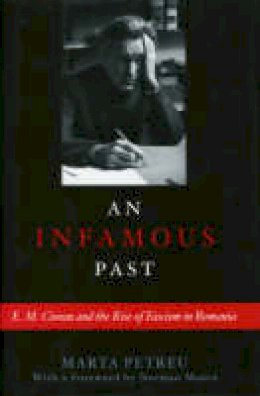
Stock image for illustration purposes only - book cover, edition or condition may vary.
An Infamous Past: E.M. Cioran and the Rise of Fascism in Romania
Marta Petreu
€ 40.51
FREE Delivery in Ireland
Description for An Infamous Past: E.M. Cioran and the Rise of Fascism in Romania
Hardcover. Num Pages: 348 pages. BIC Classification: HB; JPFQ. Category: (G) General (US: Trade). Dimension: 228 x 148 x 30. Weight in Grams: 612.
More than any other study of Cioran, Marta Petreu's intensive investigation of his life and work confronts the central problem of his biography: his relationship with political extremism. The scene of Cioran's excesses is Romania and Europe in the 1930s and 1940s, a time of xenophobia, anti-Semitism, racism, Nazism, and Stalinism. Norman Manea's Foreword reminds us of Cioran's stature in Western intellectual circles and explains the critical importance of An Infamous Past.
More than any other study of Cioran, Marta Petreu's intensive investigation of his life and work confronts the central problem of his biography: his relationship with political extremism. The scene of Cioran's excesses is Romania and Europe in the 1930s and 1940s, a time of xenophobia, anti-Semitism, racism, Nazism, and Stalinism. Norman Manea's Foreword reminds us of Cioran's stature in Western intellectual circles and explains the critical importance of An Infamous Past.
Product Details
Publisher
Ivan R. Dee, Publisher
Format
Hardback
Publication date
2005
Condition
New
Weight
612g
Number of Pages
348
Place of Publication
Chicago, United States
ISBN
9781566636070
SKU
V9781566636070
Shipping Time
Usually ships in 15 to 20 working days
Ref
99-15
About Marta Petreu
Marta Petreu lives in Romania. Norman Manea is the Francis Flournoy Professor in European Studies and Culture and writer in residence at Bard College. His most recent book is The Hooligan's Return: A Memoir.
Reviews for An Infamous Past: E.M. Cioran and the Rise of Fascism in Romania
An enormous contribution to our understanding not only of Romania's tormented past, but also of European intellectual history.
Marci Shore, Indiana University
Slavic and East European Journal
Represents the most thorough analysis of Cioran's inter-war fascination with fascism and nationalism...thought-provoking read.
Patterns Of Prejudice
A thorough and vivid portrait of a Romanian gifted fascist thinker, who dreamed about `a Romania with the population of China and the destiny of France.' Like his legionary colleagues, Emil Cioran admired Hitler, justified his crimes and believed that capitalism was `immoral, Judaic and anti-Christian.' Unlike other Iron Guard ideologists, Cioran praised Lenin and envisioned a modern Romania driven by industrialization and urban values. Like his comrades, Cioran advocated a fascist dictatorship and cultivated Corneliu Zelea Codreanu, the criminal fuhrer of the Iron Guard. But unlike his friend and fellow Iron Guard ideologist, Mircea Eliade, who did not show any willingness to part with his totalitarian past, Cioran had the decency, in his productive French exile, to regret his fascist youth and break with it.
Radu Ioanid Dense but fresh work.
Publishers Weekly
A vivid social and political memoir.
Diane C. Donovan, editor, Midwest Book Review
Midwest Book Review
A sure and unobtrusive guide to the fevered, alienated milieu that turned Cioran...into a passionate partisan of Hitler.
Robert Legvold
Foreign Affairs
Excellent.... Marta Petreu's biography is a well-documented account of everything shameful that Cioran ever wrote.
Zbigniew Janowski
First Things
Brilliantly thorough.
Carlin Romano
The Chronicle of Higher Education
From now on, I'll never read Cioran with as much appreciation.
Eric Rasmussen
University Of Illinois, Chicago
Marci Shore, Indiana University
Slavic and East European Journal
Represents the most thorough analysis of Cioran's inter-war fascination with fascism and nationalism...thought-provoking read.
Patterns Of Prejudice
A thorough and vivid portrait of a Romanian gifted fascist thinker, who dreamed about `a Romania with the population of China and the destiny of France.' Like his legionary colleagues, Emil Cioran admired Hitler, justified his crimes and believed that capitalism was `immoral, Judaic and anti-Christian.' Unlike other Iron Guard ideologists, Cioran praised Lenin and envisioned a modern Romania driven by industrialization and urban values. Like his comrades, Cioran advocated a fascist dictatorship and cultivated Corneliu Zelea Codreanu, the criminal fuhrer of the Iron Guard. But unlike his friend and fellow Iron Guard ideologist, Mircea Eliade, who did not show any willingness to part with his totalitarian past, Cioran had the decency, in his productive French exile, to regret his fascist youth and break with it.
Radu Ioanid Dense but fresh work.
Publishers Weekly
A vivid social and political memoir.
Diane C. Donovan, editor, Midwest Book Review
Midwest Book Review
A sure and unobtrusive guide to the fevered, alienated milieu that turned Cioran...into a passionate partisan of Hitler.
Robert Legvold
Foreign Affairs
Excellent.... Marta Petreu's biography is a well-documented account of everything shameful that Cioran ever wrote.
Zbigniew Janowski
First Things
Brilliantly thorough.
Carlin Romano
The Chronicle of Higher Education
From now on, I'll never read Cioran with as much appreciation.
Eric Rasmussen
University Of Illinois, Chicago
